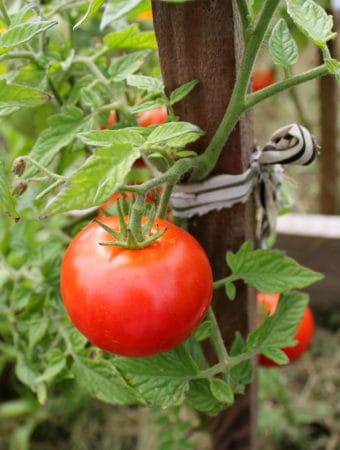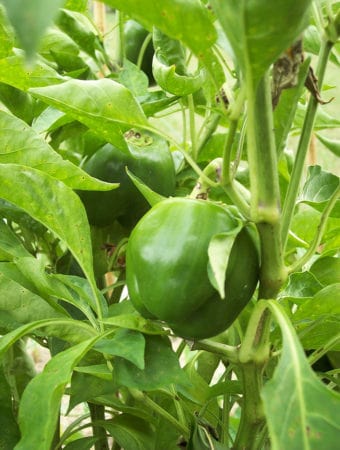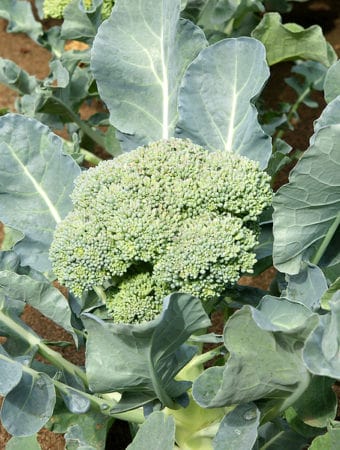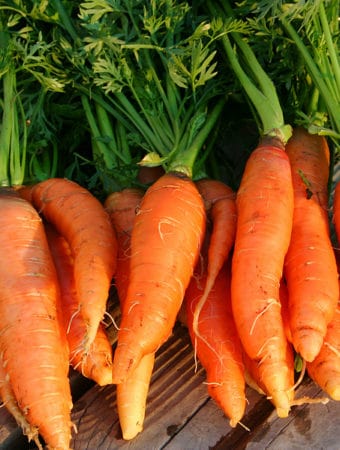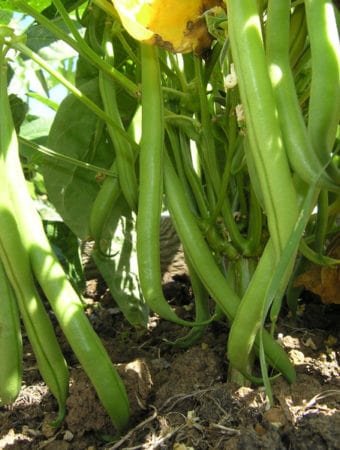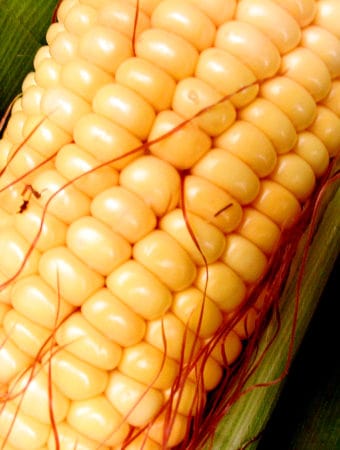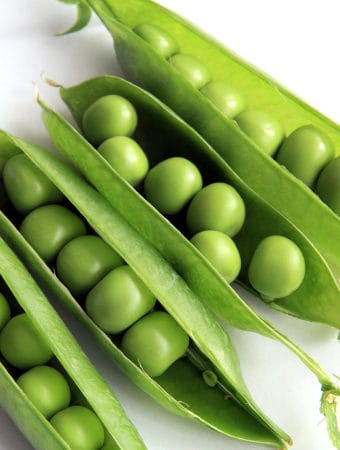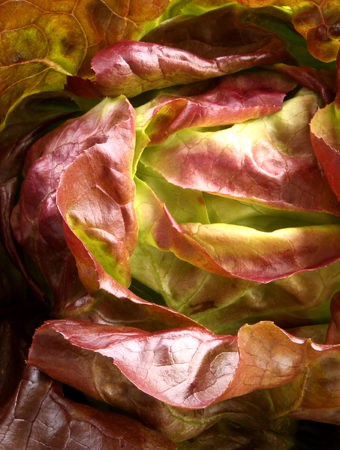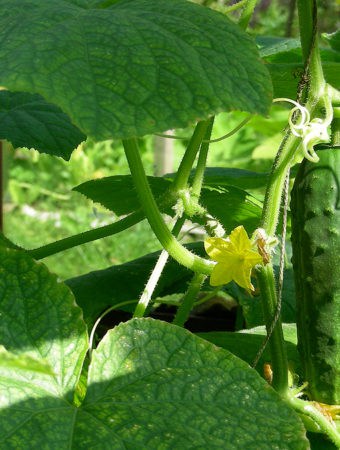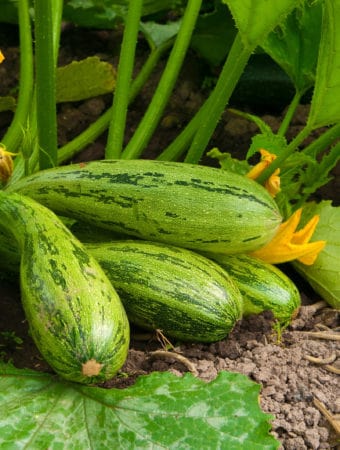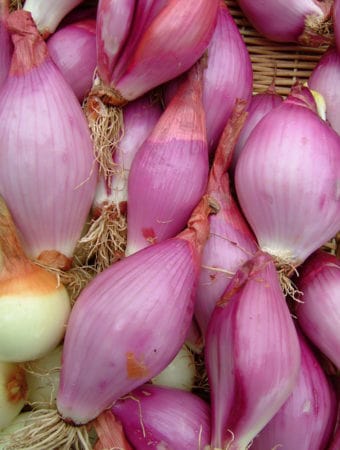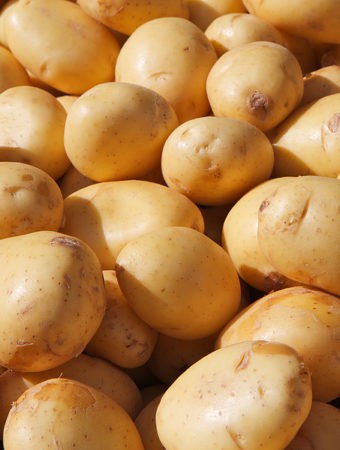The soil in your garden was created over thousands of years through the disintegration and decomposition of rock and organic matter. Temperature and rainfall, the life and death of plants, animals and bacteria, and fungi, and the rocks that were there, to begin with: all contributed to the soil you find in your garden today.
Garden wisdom: “Don’t try to grow a 5-dollar plant in a 50-cent hole. For the best results, grow a 50-cent plant in a 5-dollar hole.”
Growing vegetables starts with the soil. Soil is a mix of fine rock particles, water, air, organic matter, microorganisms, and other animals including worms. Soil is formed by the action of the weather, water, and air on rocks which causes them to break down. Over thousands of years, the surface of rock becomes soft and decays to become soil.
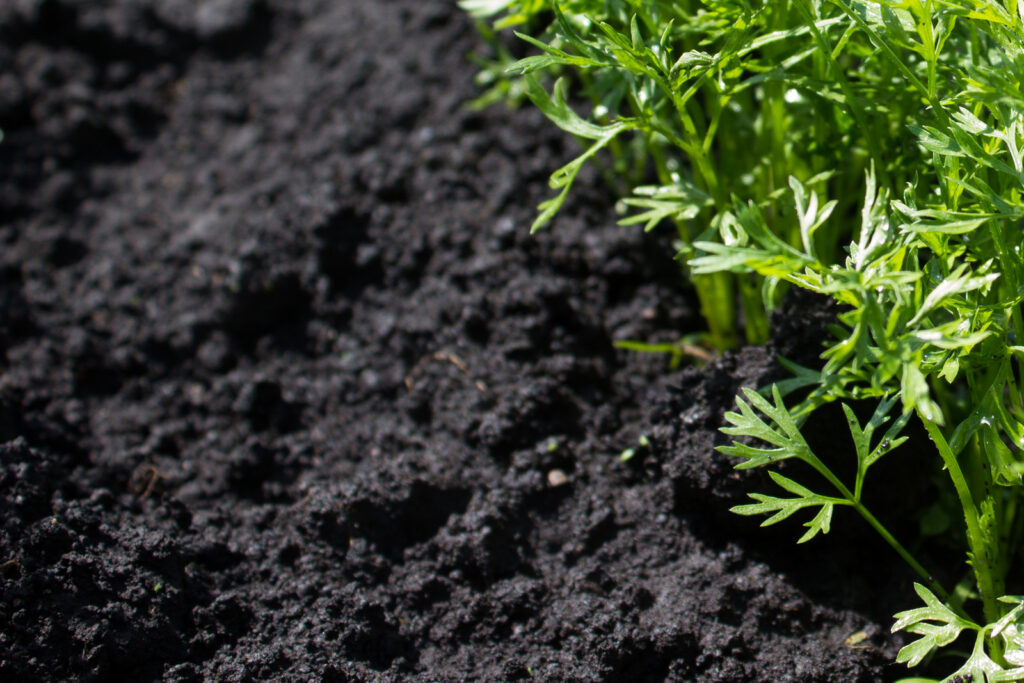
Plants add value to the soil in two ways: by root action which further breaks down rock and soil particles, and, secondly, when plants die, they decay and form humus, an organic material that makes the soil more fertile. Soil provides plants with air, water, nutrients, and a place to grow.
Tools for Vegetable Gardeners at Amazon:
- A.M. Leonard Straight Rake with Ash Handle
- All-Steel Nursery Spade with D-Grip Handle
- 4-Tine Spading Digging Fork with D-Handle
- Digital Soil pH Meter Outdoors Greenhouse
- Earthwise Handheld Electric Fertilizer Spreader
The native soil in your garden is a mix of the rock below it and organic matter including decayed plants and animals, animal manure, and dead and decaying soil organisms. The soil varies from place to place. Silty soil is often found near the coast, lakes, and rivers. Sandy and clay soils are found both near and away from water. Alkaline soils are commonly found above limestone deposits, often in very dry climates.
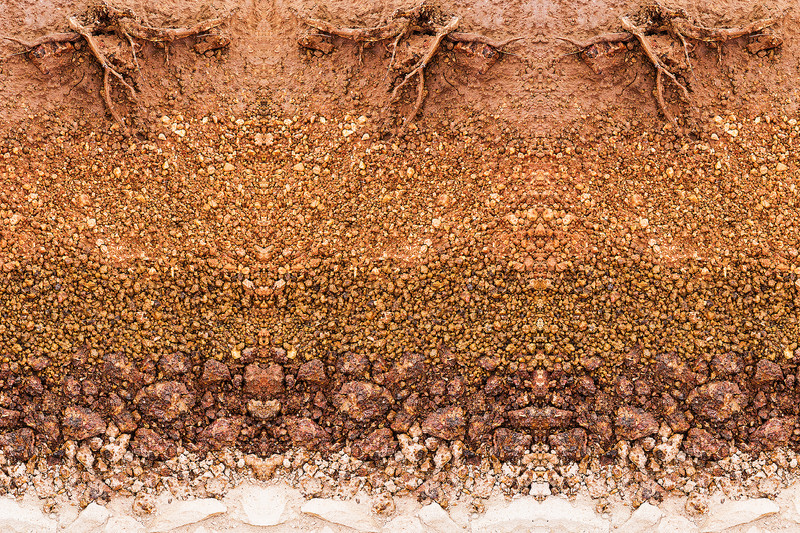
Understanding garden soil
Soil components
Soil minerals and organic matter make up the solid part of your soil. Air and water occupy the pore spaces between your soil’s solid particles. All of these provide nutrients, moisture, and anchorage for plants. Depending upon where you stand in your garden, these components are present in varying amounts.
Soil size
The particles in your soil are of many sizes and shapes. Coarse particles such as gravel and stones are not conducive to plant growth. Your garden can do without them. The soil particles that support plant growth are divided into three sizes: sand, silt, and clay. Sand particles are the largest of these three; the clay particles are the smallest.
Soil texture
The combination of sand, silt, and clay in your soil is called soil texture. Soil texture affects your soil’s fitness for growing plants, sometimes called tilth.
Clay soils are sticky and plastic when wet and hard and compact when dry. Sandy soils are gritty and do not form cohesive clumps. Silt falls in between; it is smooth when dry and silky or slippery when wet. A soil that is mostly sandy and coarse textured is called light. A soil that is mostly clay or fine textured is called heavy.
Light or loose soils have a low capacity for holding water and storing the nutrients plants need. The nutrients simply leach away. Heavy soils are heavy and dense. The movement and exchange of water and air which plants require for growth are inhibited in clay soil. Silt—which has larger particles than clay—has more surface exposure and a higher water-holding capacity than sandy soils but smaller pores and fewer air spaces.
Soil water
Soil water is important for plant growth because it acts as the solvent in which plant mineral nutrients are dissolved to form the soil solution. The soil solution transports nutrients to plant roots where they are taken up to meet a plant’s nutritional needs.
Soil air
Soil air is important because it contains oxygen essential for root respiration—the intake of oxygen by plant roots and the release of carbon dioxide. When the air pores in the soil become waterlogged, plant roots cannot respire and plants become oxygen starved and can suffocate like any other living being.
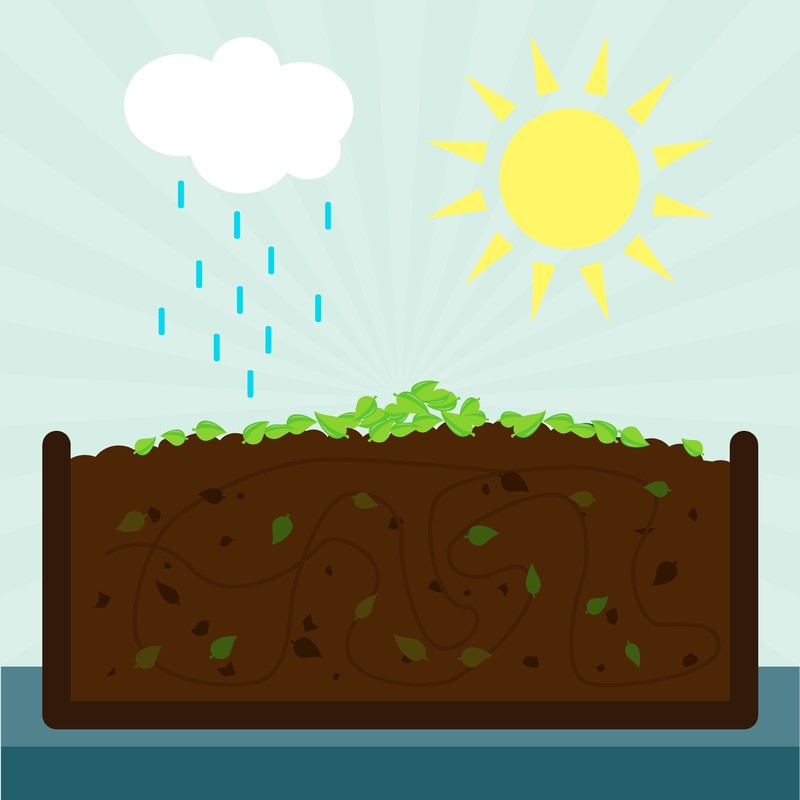
Organic matter in the soil
Soil organic matter includes fungi, bacteria, earthworms, and plant and animal residues in various stages of decomposition. The decomposition of soil organic matter releases nutrients such as nitrogen, phosphorus, and sulfur that can be taken up by plant roots.
The organic matter in your soil that can decompose no further is called humus or mature compost. Humus is black or dark brown. It feeds soil micro-organisms and other creatures boosting soil life and the availability of nutrients to plants. It holds up to 80 percent of its weight in moisture increasing the availability of moisture to plants in dry times. It serves as a buffer between acidity and alkalinity. It improves soil aeration, and it holds the warmth of the sun in cool weather.
Organic matter turned to humus is just what your garden needs to grow healthy plants. Humus is the Latin word for soil.
The best soil for the garden
What soil is best for your garden? What soil contains the right amount of air, water, solid particles, and nutrients to grow plants?
The answer: Add just 5 or 10 percent organic matter to a soil that has too much sand or too much clay and you will create loam. Loam is the best soil for growing plants. Loam includes organic matter without predominant proportions of silt, sand, clay, or stones. It is moisture-retentive and easily worked, with not too much sand or too much clay or too much silt. It is fertile and has tilth.
Soil test
Here’s a way to judge your soil’s fitness for growing plants: If you drop a spadeful of moist soil on a hard surface and it breaks into ½-inch (1.3 cm) diameter crumbs, you can say your soil has good tilth and is ready for planting. But if the soil breaks into large clods, your soil contains too much clay and needs the addition of organic matter. If it holds no form at all when dropped, your soil is too sandy and needs the addition of organic matter.
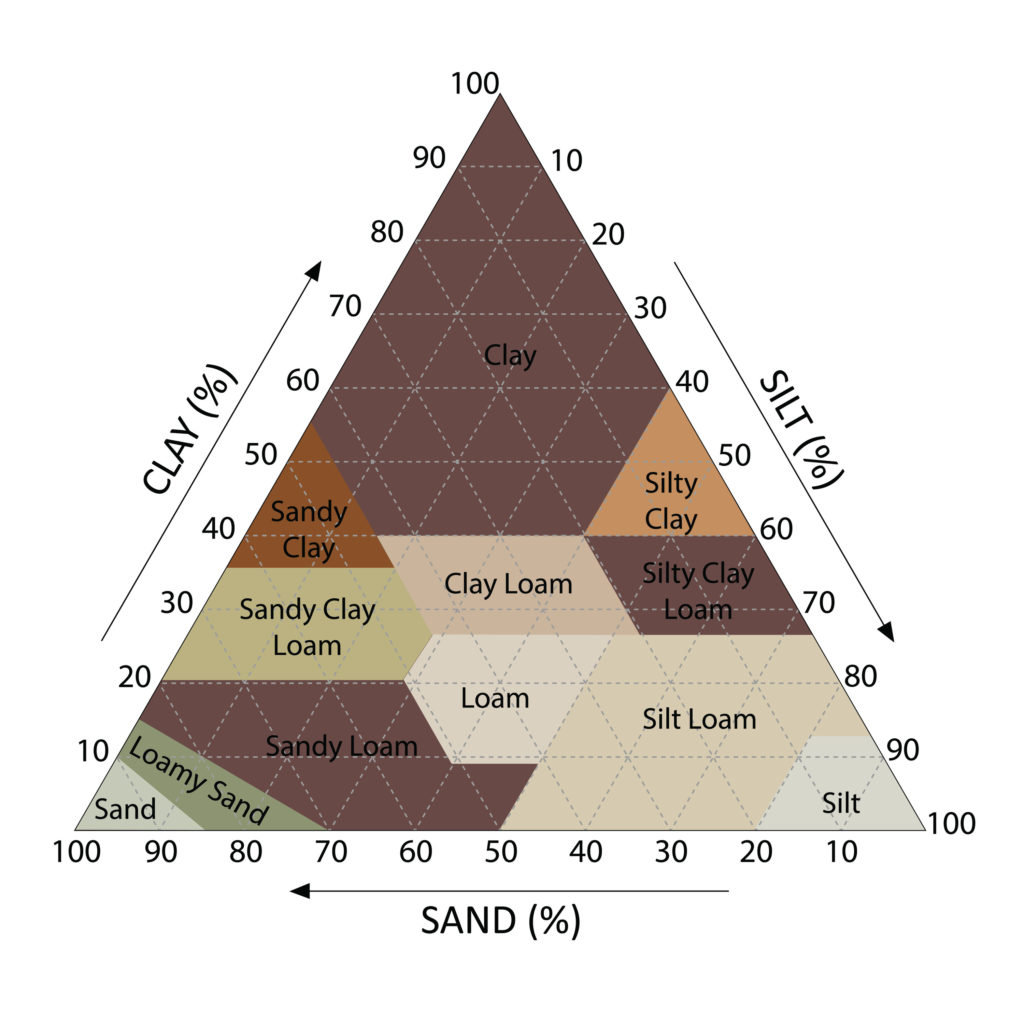
A soil textural triangle is used to determine soil textural class from the percentages of sand, silt, and clay in the soil.
Types of soil
Scientists have described many different soil textures, all a combination of differing proportions of sand, silt, clay, and humus. Several kinds of soil can exist in one backyard. Here are basic soil types and soil-related descriptions:
- Clay soil is made up mostly of very small finely textured flat particles. Clay particles commonly pack together tightly like a stack of wet plates; they stick together. Clay soil is sticky when wet and hard and crusty when dry. Clay soil particles are so dense they make it difficult for oxygen to reach plant roots and water to drain away. Clay soil compacts easily and is slow to warm in spring.
- Sandy soil is made up mostly of large, coarse particles. The space between sand particles is relatively large and porous. Sandy soil allows water and nutrients to drain away easily. When soil can’t hold water and nutrients, plants can’t thrive.
- Silty soil is minute, smooth, and fine. Between your fingers, it feels much like flour. Silt particles under a microscope are irregular in shape. Mineral elements can adhere to silt, unlike clay or sand particles. Silty soil tends to be fertile. As well, silt allows for soil oxygen to pass through. Silt usually doesn’t make up a very high proportion of any soil except where it is washed and deposited by water and combines with clay.
- Humus-rich soil. Humus is not a soil per se, but a description of the advanced decay of organic matter in soil. Humus is an organic matter made up of decayed leaves, plant parts, and rotting soil microorganisms and animals. Humus might be described as gummy but not sticky like clay. Humus can fill the space between soil particles, coating sand, silt, and clay particles so that they cling together to form crumbs of soil. Humus binds soil moisture and minerals to soil crumbs making the moisture and minerals available to plant roots. Humus makes sandy soil heavier and clay soil lighter. Humus makes soil “friable,” meaning easy to work. Plants like to grow in friable soil.
- Loam and sandy loam is a combination of a moderate amount of sand, some clay and silt, and humus. When sand, clay, and silt particles are present but no one is dominant and humus is present, the soil is called loam. Loam is warm, easy to work, and holds moderate amounts of moisture and nutrients. Loam is a good growing medium for plant roots and an outstanding vegetable garden soil. Slightly sandy or silty loam is the gold standard of garden soil.
Soil texture
The texture of soil helps to determine its fertility. Soil texture and fertility can be improved by the addition of humus and lesser decayed organic matter (as evidenced in loam). The more organic matter added to sand, silt, and clay the more improved the texture of the soil.
A very good soil mix
Here’s one formula for a very good soil mix:
- About 40 to 45 percent of inorganic rock materials—particles of sand, silt, and clay.
- About 25 percent soil water.
- About 25 percent of soil air—is a combination of oxygen and carbon dioxide.
- About 5 to 10 percent humus—fully and partially decayed plant and animal remains. Humus binds sand, silt, and clay particles to make soil crumbs.
Key ingredients of soil
Air and water in the soil
Half the volume of soil is air and water which fill the spaces or pores between crumbs of soil. Plant roots and soil microorganisms breathe in oxygen from the soil air. Plant roots absorb minerals dissolved in soil water. Soil air and water are essential for plant root, stem, and leaf growth. When soil does not drain well and the air is forced out, water occupies soil pore space and plants suffocate or drown.
Soil tilth and texture
Soil texture is important because it determines a soil’s ability to act as a growing medium for plants—that ability is referred to as “tilth.” Tilth describes not only a soil’s texture but its capacity to hold nutrients and water. A sandy, coarse-textured soil is called “light” soil. A clay or fine-textured soil is called “heavy” soil. A soil that combines sand, silt, clay, and humus is called “loam”; loam is a “medium” soil. The subjective “feel”—how the soil feels between your fingers—determines its texture and tilth. With experience, a gardener can name the soil texture in the garden.
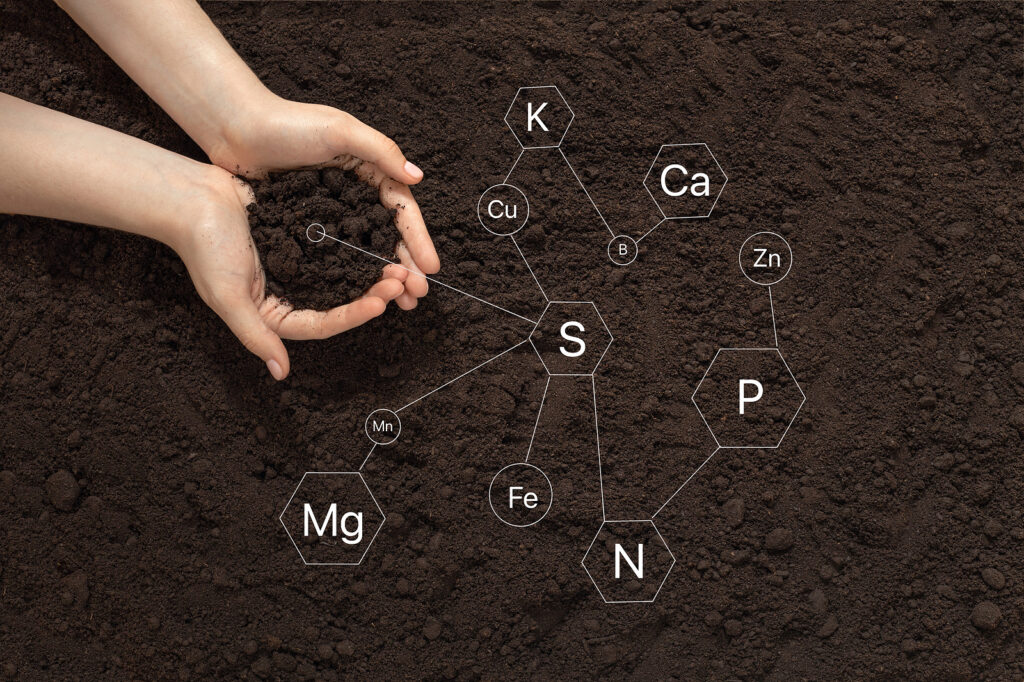
Soil fertility
The fertility of soil depends upon the availability of essential elements needed for plant growth. Those elements are largely nitrogen, phosphorus, and potassium (called macronutrients), and to lesser degree sulfur, calcium, and magnesium (called micronutrients), and an even lesser amount of other elements—iron, manganese, boron, copper, zinc, and molybdenum (called trace elements). From the atmosphere, plants draw upon the macronutrients carbon, hydrogen, and oxygen.
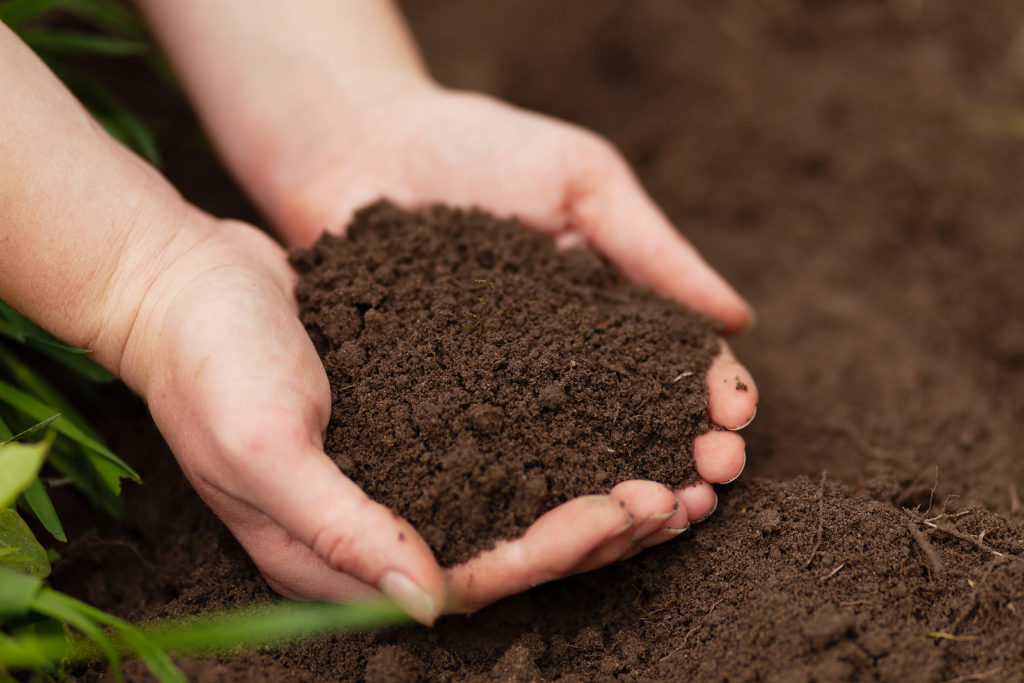
Earthworms and soil microorganisms
The lives of soil microorganisms and earthworms are essential to the health of vegetable garden soil. Microorganisms and worms are important to the decay cycle—nature’s way of recycling dead and dying organic material. Through the decay cycle, plants and animals of all sizes die, decompose, and return to the soil becoming essential nutrients needed to feed new plants and animals.
Earthworms and soil-dwelling insects–mites, beetles, and millipedes–and soil microorganisms– nematodes, protozoa, fungi, bacteria, and actinomycetes–convert dead and dying plant tissue into humus. They eat dead plant tissue and return it to the soil as humus (a fancy name for mostly worm and microorganism poop). Humus–organic matter in a highly decayed state–is rich in essential minerals necessary for plant growth and works to improve soil structure.
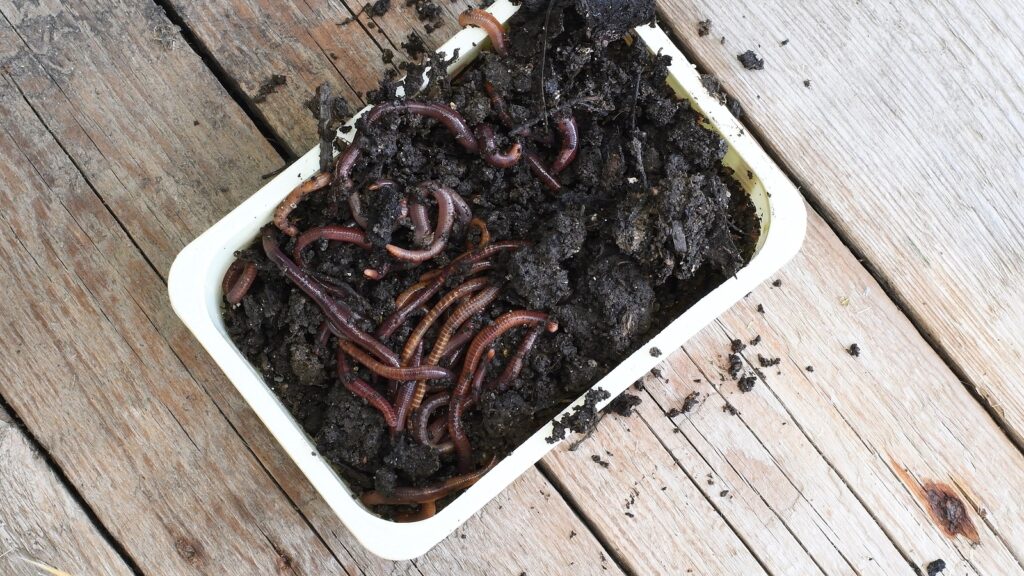
Earthworms produce their own weight in castings—manure—each day, literally eating their way through the soil and organic matter. Earthworms convert nitrogen-rich organic matter into proteins. Their poop is rich in nutrients that can be used by plants almost immediately, and when worms die their protein-rich bodies return nitrogen to the soil.
The most successful way to introduce worms and beneficial soil microorganisms to your garden is to simply dig up a clump of soil or grass from a worm-rich lawn or garden and relocate it to your garden. Earthworms and soil microorganisms prefer slightly cool, moist soil; very warm weather will slow earthworm activity and send them deeper into the cool subsoil. Compost-rich mulch will bring earthworms closer to the surface.
What earthworms do
Earthworms and other soil organisms contribute to soil fertility. They mostly live near the soil surface in the root zone of vegetable crops and other plants. Earthworms are segmented worms. They feed on plant residues and move about. As they move about feeding, they stir and aerate the soil by leaving holes in it; this improves soil structure.
As earthworms feed and digest decaying organic plant residues, their excreta, and casts are very high in plant-available nutrients, such as phosphates, potassium, nitrate-nitrogen, and exchangeable calcium and magnesium. Plants can take these nutrients up with little effort.
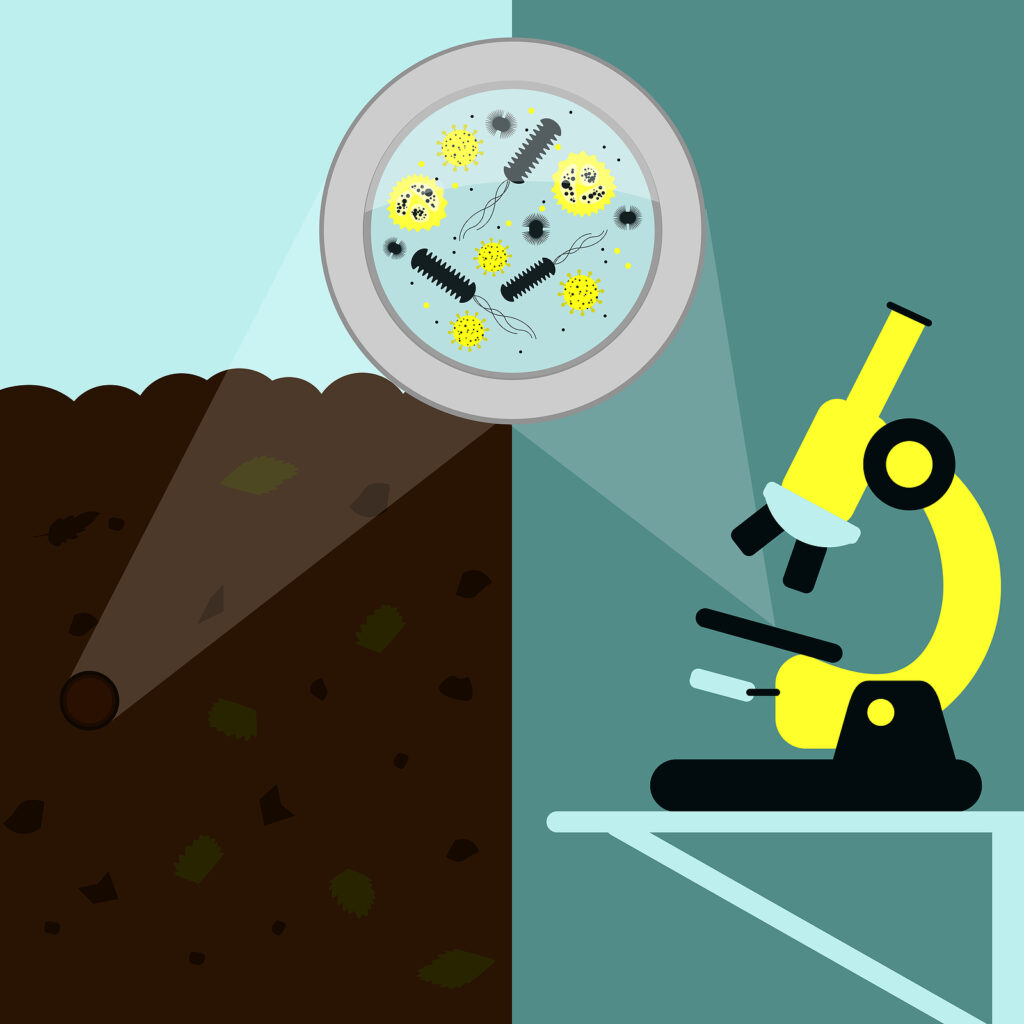
What beneficial soil microorganisms do
Beneficial soil microorganisms (bacteria and fungi) are decomposers and recyclers. They feed on decaying plant residues left in the soil after harvest or when a plant dies; they decompose plant residues and recycle them into beneficial products such as humus.
Beneficial organisms also release plant nutrient elements in simple mineral form–formerly bound up in complex organic molecules in soil organic matter. These minerals then become available for uptake by plants.
Not all beneficial soil bacteria and fungi feed on decaying matter; some groups of beneficial fungi and bacteria form associations with plant roots. Some can fix or convert atmospheric nitrogen into soil-based nitrogen ions which plant roots can use.
Some soil fungi form associations with roots; these associations are called mycorrhizae. The plant roots provide carbon-containing compounds that serve as food for the fungi, and the fungi improve the plant roots’ absorption of phosphorous and sometimes other plant nutrients.
How to know your soil
Here are three simple tests to determine what kind of soil is in your garden.
Soil Test 1. Place a small clump of soil in your hand and squeeze. If the soil forms a shiny, wet ball, when you open your hand, you have clay soil. If the soil disintegrates in your palm and holds no form, you have sandy soil. If the soil holds together in a light, slightly loose clump until you drop it to the ground, you have loam soil. Loam is friable soil.
Soil Test 2. Place a small handful of moist soil between your thumb and the first knuckle of your forefinger. Squeeze the soil out between your thumb and your finger to form a ribbon. If the ribbon holds together for more than an inch, the soil is heavy clay. If a ribbon forms for ¾ of an inch, the soil is silty-clay loam. If the ribbon breaks shorter than ¾ of an inch, the soil is silty. If no ribbon forms, the soil is sandy.
Soil Test 3. Dig a small hole in the garden about 12 inches (30 cm) deep. Fill the hole with water. Measure the time it takes for the hole to naturally drain. If the hole is empty in less than five minutes, the soil is sandy or sandy loam. If the hole takes 15 minutes or longer to drain, the soil is clay-like.
Improving garden soil with organic amendments
You can improve your vegetable garden soil with organic amendments.
Organic materials such as aged compost will add nutrients to the soil. Organic matter will also help the soil retain moisture as well as help it to be well-drained.
You can add or amend the soil with organic matter any time of the year. Good times to amend the soil with organic matter are in late winter or early spring a month or two before you sow seeds or set out transplants or in autumn after the harvest. You can do this by laying a layer of compost or other organic material across the soil—called sheet composting—and letting rain or irrigation carry nutrients deep into the soil. You can also add organic material to the garden during the growing season by side-dressing around plants with aged compost.
Sheet composting
Sheet composting is a method of adding organic material to the garden by spreading it across the top of the soil. Spread an inch or two of aged compost or organic planting mix (which is the name for commercial aged compost) across the bed then let it work itself into the soil naturally.
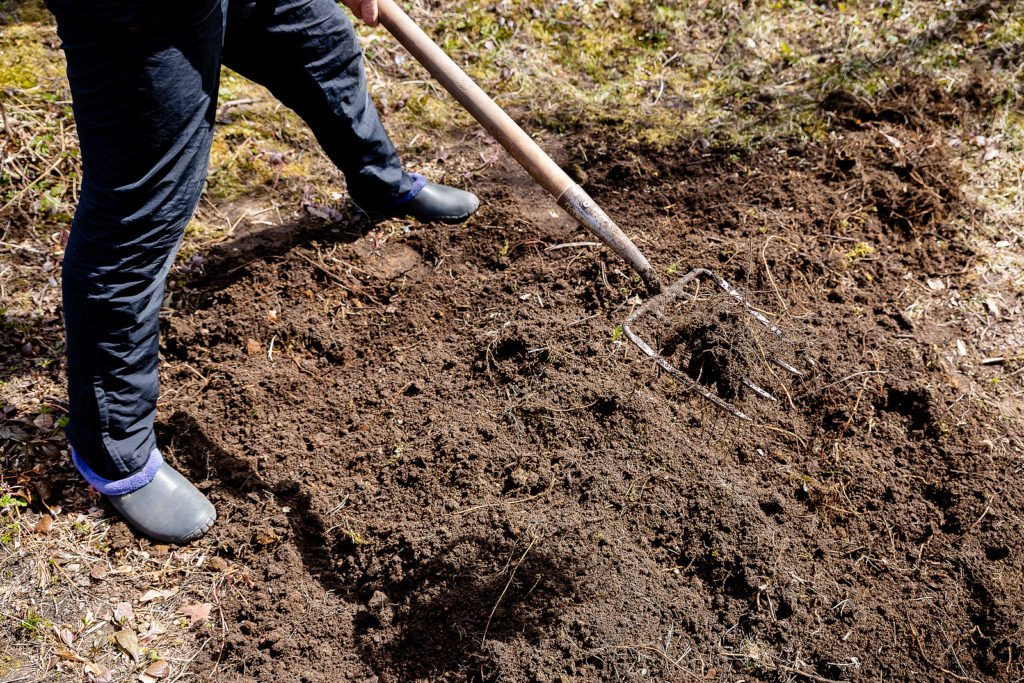
Forking and turning the soil
An alternative to sheet composting is using a garden fork, rake, or shovel to gently turn the aged compost or amendment below the soil surface.
Tilling the soil
Some farmers and gardeners use mechanical devices to till the soil. This is a way to add amendments deeper into the soil. However, tilling too deeply can disturb earthworms and microorganisms at work beneath the soil.
“No dig” gardening
No dig gardeners do not till the soil. They use the sheet composting method to add organic matter to the soil layer by layer. By not digging or turning the soil they leave soil organisms undisturbed.
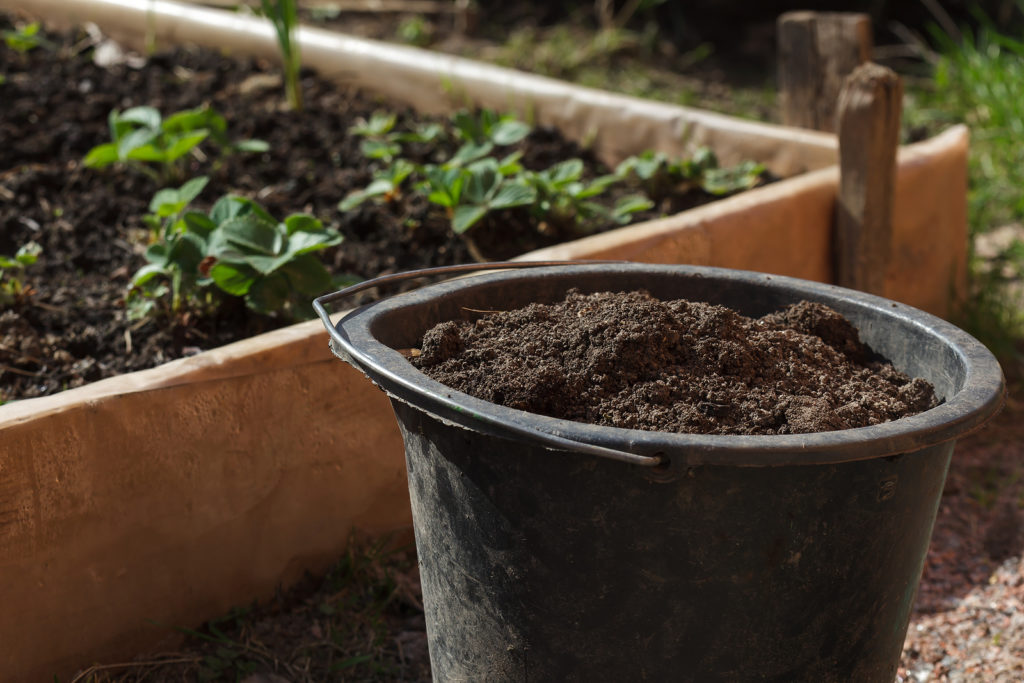
Side-dressing during the season
Soil amendments also can be added to the garden during the growing season. Simply sprinkle or spread the amendments by hand around growing plants; this is called side dressing.
Soil amendments
Here are common organic soil amendments that will benefit your garden:
Compost. Compost is partially decomposed organic matter—leaves, grass clippings, dead plants, and vegetable kitchen waste (but no meats or dairy products). Compost is an important source of humus and is rich in nitrogen, phosphorus, potassium, and important trace elements necessary for plant growth. Compost has a crumbly texture and can be used as a soil conditioner and particularly when well finished—meaning decomposed–as a fertilizer. (Unfinished or partially decomposed compost can retard the germination and growth of some plants as it actually draws nitrogen from the soil to help the decomposition process.) A garden can never have too much finished compost.
Manure
Cow, horse, poultry, and rabbit manure are common sources of nitrogen and to a lesser degree phosphorus and potassium in gardens. Aged or rotted manure will turn to humus in short order. But don’t use animal manures too soon. Fresh animal manure contains salts that can burn plant tissue; “hot” (fresh) manure should be aged before being added to the vegetable garden. Dog and cat litter should be excluded from the garden or compost pile; that litter may contain disease organisms harmful to humans.
Green manure
Green manure is a crop that is grown in the garden and then incorporated into the soil to increase soil fertility or improve soil structure. Green manures are fast-growing plants. They include leguminous or pea-family plants (lupines, vetch, crimson, or French clover which help fix or add nitrogen to the soil), cruciferous plants (mustard, turnips, and winter rape which are grown for the bulk of their foliage), grasses (rye and Italian rye), and buckwheat. Green manure should be mowed or cut and turned into the soil just before flowering. Green manures decompose into humus. After the garden is harvested in the fall, planting a green manure cover crop will help prevent erosion, add nutrients to the soil, improve drainage, and choke out weeds.
Peat moss
(Note: peat moss is a non-renewable resource and is not sold in many countries.) Peat moss is partially decomposed mosses and sedges which are usually harvested or mined from boggy areas. Peat moss is not rich in nutrients and is slow to decompose but readily lightens heavy clay soil and helps dry soil retain moisture. Peat moss will not enhance soil fertility alone. The best peat moss is black and at an advanced stage of decomposition. ***Peat moss is a very slowly renewed resource and is best used when locally available not shipped to your garden from far away.
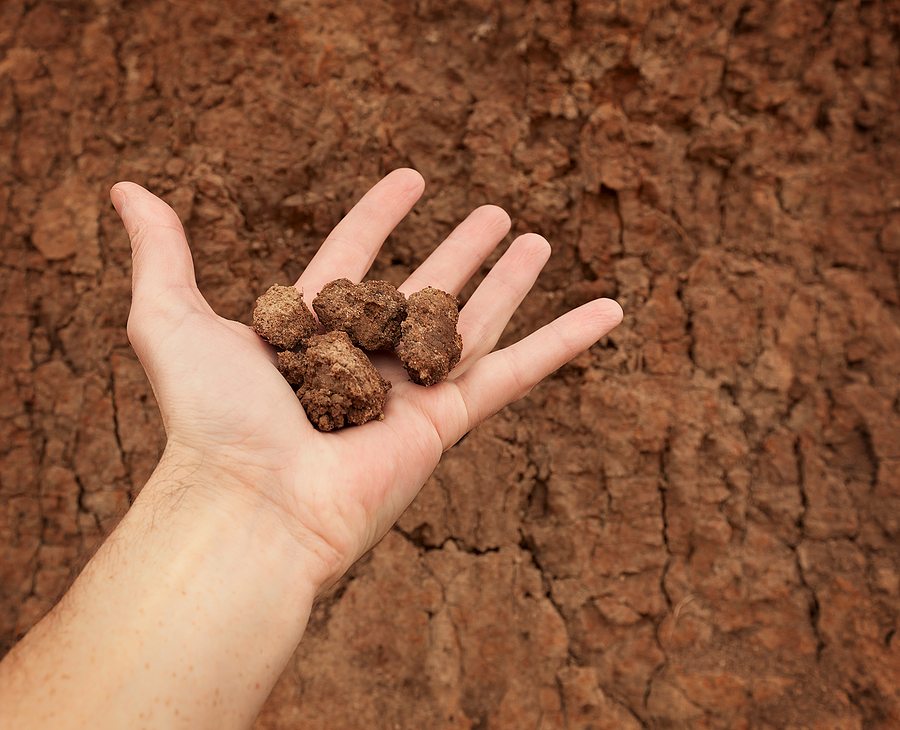
How to improve clay soil
Clay soils are too wet or too dry, slow to drain, slow to warm in the spring, and slow to release nutrients to plant roots. The best way to improve clay soil is to add several inches of organic matter such as aged compost to planting beds regularly—at least twice a year–and work it into the soil to a depth of 4 to 6 inches.
Clay soil is made up of very fine mineral particles from many different rock types; these fine, thin, flat particles are easily compacted. While the minerals in clay soil can be used for plant growth, the particles are so fine that they stick to each other leaving very little room for plant roots to grow and thrive. A mix of soil moisture, oxygen, and minerals is important for the chemical reactions necessary for nutrients to be drawn up by plant roots.
The best soil for plant growth is a mixture of sand, silt, clay, and organic matter—this type of soil is called loam. The best loam should be about 50 percent mineral and organic matter and 50 percent space between the solids. (The space should be half filled with water and half oxygen for optimal plant growth). The mix of minerals and organic materials form granules or aggregates which act like a slow-release fertilizer for plants.
Clay soil feels slippery and soft like cold butter. There is almost no granularity in clay soil. Water adheres to the flat surface of clay particles and is very slow to drain away. The lack of space between clay particles keeps clay soil from warming along with the air temperature in spring.
Clay soil squeeze test
To test for clay soil, give your soil the squeeze test: pick up a handful of soil and squeeze it. Clay soil will form a solid dense ball. (Sandy soil will slip through your fingers; loamy soil will hold together without packing densely.)
Add organic matter
To improve clay soil—or any soil, add organic matter. Aged compost, leaf mold, or aged manure will improve the texture of clay soil aiding drainage and aeration. Organic matter will make clay soil healthier. (Organic matter is rich in bacteria and other microorganisms that contribute to the process of decomposition which helps enrich the soil.)
Add organic matter at least two inches thick over the soil and work it under to a depth of 4 to 6 inches. You can use aged compost from your compost pile or bagged compost or planting mix available at garden centers. To rapidly improve your garden soil, add organic matter twice a year—first in spring about two weeks before you plan to plant, and again in the fall after you have harvested your final crops. If you garden year-round, add organic matter to your planting beds as a side-dressing—spreading it around each crop and along planting rows.
Sheet composting
If turning the soil is too difficult, spread the organic matter over the soil and let the rain and irrigation work it into the soil; no spading is necessary. (Sheet composting is a simple way to add compost to your planting beds: spread leaves, manure, grass clipping, garden waste, and kitchen waste directly on the planting bed and turn it under.)
Peat moss
Peat moss will improve the structure of clay soil, but peat moss is generally quite acidic so limestone should be added as well (about five pounds per 100 square feet). To cover a planting bed 10 x 10 feet (100 square feet) to a depth of 2 inches you will need 18 cubic feet of organic matter (1 cubic yard equals 27 cubic feet); to cover the same planting bed to a depth of 4 inches, you will need 35 cubic feet. (Note: peat moss is a non-renewable resource and is not sold in many countries.)
Grow organic matter
Another way to improve clay soil is to grow organic matter. Sow a cover crop (a crop to cover your planting bed when you are not growing vegetables) and then till it under when it is several inches tall. Cool-weather cover crops include crimson clover, vetches, rye, and buckwheat. Warm-weather cover crops include cowpeas, soybeans, millet, and Sudan grass. Be sure to turn under cover crops while they are still succulent.
Related articles of interest:
Vegetable Plant Nutrients: Sources and Deficiencies
Garden Planning Books at Amazon:
- Vegetable Garden Grower’s Guide
- Tomato Grower’s Answer Book
- Vegetable Garden Almanac & Planner
- Kitchen Garden Grower’s Guide Vegetable Encyclopedia


